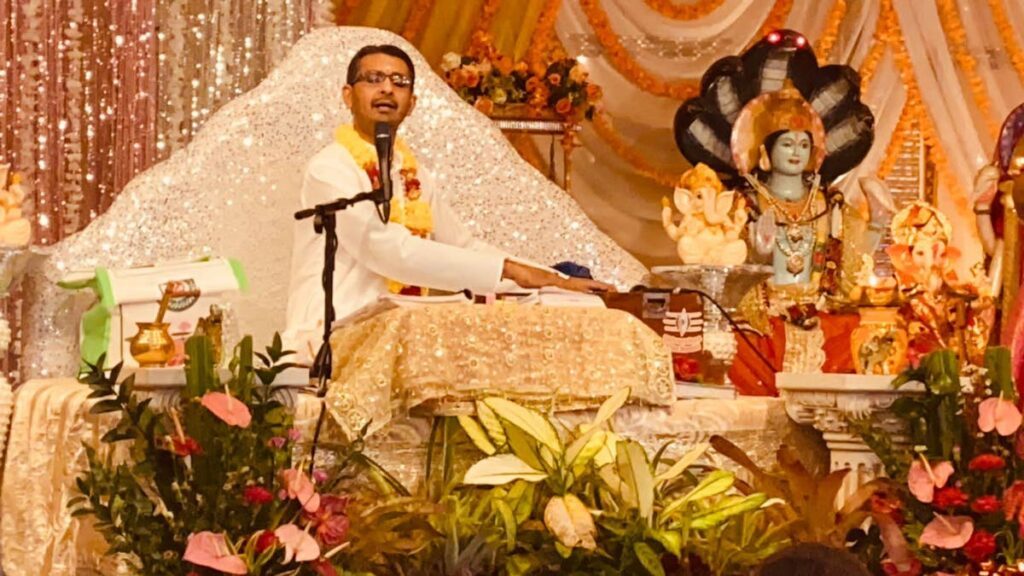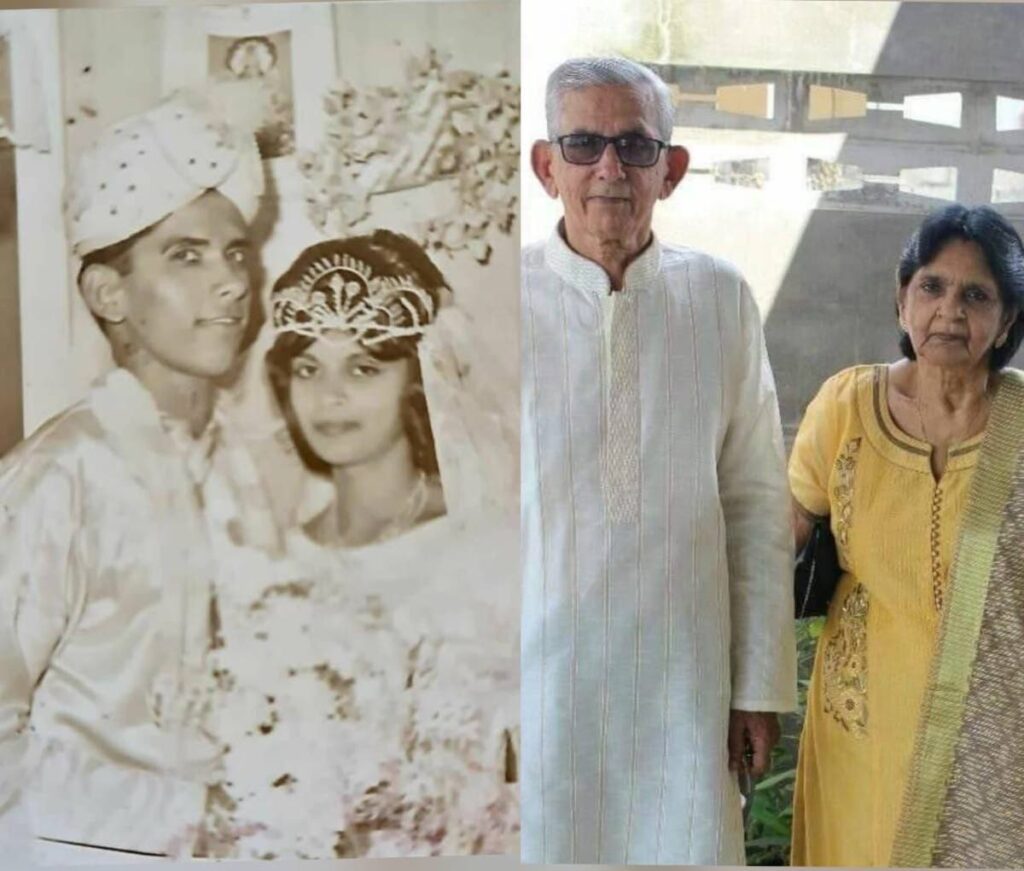Indian Heritage Month: Family produces 4 generations of pundits

BAVINA SOOKDEO
As the country observes Indian Heritage Month, pundit Navin Omadath Maharaj emphasises the importance of understanding and appreciating the social diversity, practices, and traditions of each community within our cosmopolitan society.
Maharaj is a 48-year-old fourth-generation pundit and an acting vice principal who engages with young people, imparts knowledge to future generations, and offers life guidance rooted in Hindu teachings. He believes that respect and tolerance for each other’s cultures are essential for developing harmonious relationships and fostering societal growth.
“This month serves as a perfect opportunity to express these perspectives,” he says.

The pundit continues the legacy initiated by his great-grandparents, pundit Parmeshwar Chowbay and Shrimati Mahadai Chowbay, who arrived in Trinidad from Bihar, India in 1908.
“My family has maintained the tradition of being
purohits (pundits) for generations, serving dharma by maintaining sacred obligations and duties to society and God,” Maharaj shared in an interview.

Chowbay was an ardent devotee of Lord Shiva (the Hindu god who creates, protects and transforms the universe) and a skilful
sarangi (a short-necked three-stringed instrument played with a bow) player from a background of Shandilya Brahmins.
His great-grandparents had six children – four sons: Hariprasad, Dindial, Radhay Kishore, Benny Madho – and two daughters: Ramrajie and Baboonie.
Three sons eventually went on to become pundits. Radhay Kishore married Batchiya and they had five children: – Jassodra, Ramesh, Deodath, Hemloutie and Baldath. The eldest son, pundit Ramesh, married Basanti and had three sons – Navin Omadath, Avindranath and Surindra.
Aside from being the fourth generation of pundits from his paternal lineage, Maharaj’s
nani (maternal grandmother) was the daughter of the late pundits Vyas and Samdaye.
Maharaj was first tutored by his father, pundit Ramesh Kishore Maharaj.
“My initial guidance in Hindi, Ramayan, singing, and chanting came from my father,” he recalled. His training was further enriched by his guru, the late pundit Krishendath (Kaysho) Byragie, who taught him Sanskrit, Pauranic literature, Pravachan, Karamkhand and astrology. Maharaj also did a two-year course with the Sanatan Dharma Maha Sabha Pandits Parishad in 2002 and continues his education through online courses offered by the Bharatiya Vidya Bhawan University, New Delhi.His dedication extends beyond his personal practice. As of July 2023, he was elected president of the Pandits Parishad of the Sanatan Dharma Maha Sabha. Between September 2022 and June 2023, he served as the public relations officer of the Inter Religious Organisation (IRO) and since June 2023 he has been its assistant secretary. Currently the acting vice principal (secondary) at Vishnu Boys’ Hindu College, Maharaj is also an executive member of the Sanatan Dharma Maha Sabha and has been the spiritual head at the SDMS Munroe Road Shiv Mandir for the past 15 years.
Juggling so many roles requires organisation and dedication.

“It takes a lot of dedication, planning, commitment, discipline, and personal sacrifice to effectively strike a balance amongst the varying roles,” Maharaj explained.
Daily prayers and personal worship are integral to his routine, providing him with the motivation to manage his responsibilities effectively.
Explaining that Sanatan Dharma forms the cornerstone of his life, Maharaj attributes his grounding in Hinduism to his mother, who instilled in him the values and principles from scriptures like the Ramayan and Bhagavad Gita.
As for what aspects of Hinduism are most important to him, Maharaj said, “Maintaining tradition in its purest form guided by the injunctions laid down in the scriptures has always been a strong point for me.
“Although there are many changes which are taking place as our society evolves, it’s important to keep focused on what has been pointed to in scriptures. Our actions in adherence to scriptural guidance ensure purity of action and dharma. This is important towards leading a noble and virtuous life. If we were to only give way to our own bias and negate the principles of our dharma, then our live would be subject to confusion, misunderstanding and regret.”

As a fourth-generation pundit, what does this legacy mean to Maharaj?
“For my family, this is part of our inherent dharmic duty. In fact, from a tender age when we are initiated into
Upanayan (taking of the sacred thread worn by pundits called janeo) it is hoped that one would lead and follow the path of our foreparents. Although we reserve the right to choose, I think part of our spiritual being moves us towards performance of such.
“Personally, there is no reward or gain as great as seeing your dharma flourish. This brings a sense of satisfaction and contentment knowing that you’re born into such a home and family, and you can maintain and fulfil such noble traditions.”
As for what steps he is taking to ensure this tradition continues for future generations, he said, “As part of my secular duties, young pundits are initiated, trained and tutored in all of the associated rites, rituals and philosophies at the SDMS Parasram School of Hinduism.”
As for what he loves most about being a pundit, Maharaj said, “It provides an opportunity to serve my dharma and a higher calling. This is the cornerstone of duty as is illustrated in our scriptures, not for...personal gain but for the betterment and upliftment of other souls.”
Maharaj is optimistic about the future of Hinduism, but acknowledges the challenges it faces.
“I think there has been a renewed renaissance of Hinduism globally. Many practices as well as teachings are being spread, shared and accepted by young Hindus. In TT, although there has been continuity from one generation to another, it is concerning that some of the fundamental practices are being eroded by misinformation.

“There is a need for a greater effort to uphold traditions of our dharma, and this can only take place if a concerted effort is made by the relevant custodians (parents, elders, pundits, temples) encourage and foster practice at homes and elsewhere.”
For Maharaj, Indian Heritage Month is a time to reflect on the resilience and contributions of forefathers.
“This is a reminder of struggles of our forefathers and resilience they demonstrated to ensure the betterment and welfare of their descendants socially, economically and religiously. They maintained traditions in spite of the limitations they faced.”
He believes the month promotes and preserves Hindu culture through various activities that celebrate music, food, dress and language.
Maharaj encourages young people to embrace their cultural and religious practices.
“One must understand the greater purpose of life. The tangible benefits such as name, fame, etcetera, mean very little without a core understanding of religious and cultural practices.

“We should focus on being better human beings. This can only be translated with well-rooted spiritual practices, therefore, simple things like attending temple and
satsangs (congregating for the performance of devotional activities), etcetera.
“Engage in daily prayer, be proud of your culture and traditions, engage in service to others, practise compassion, forbearance, good speech and respect for self and for others.”
As for how individuals can contribute to the preservation and promotion of Indian culture and heritage, he said, “This can only happen by engaging in activities which help to develop an awareness and foster a sense of pride, duty and loyalty to one’s heritage.
“Be proud of your traditions and practices. Wear your clothing proudly. Take time to study and know your scriptures and teachings. Share garnered experiences with kith and kin.
“Understand from a historical perspective sacrifices made by our ancestors and preserve at all cost elements of our culture.”

Comments
"Indian Heritage Month: Family produces 4 generations of pundits"